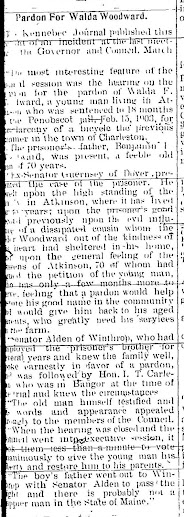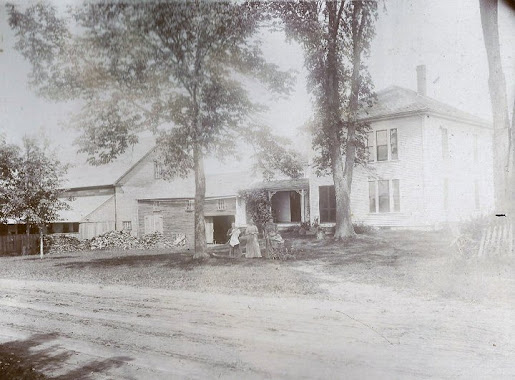One advantage with doing
genealogy today is that so much information about our ancestors is available by
searching online. One source that has been a very useful tool is digital
newspapers and more being added all the time. These newspapers can be searched
easily by typing in your ancestor's name or surname.
Recently I did a search of
Maine's digital newspapers, specifically the Piscataquis Observer as several my
mother's family is from that area of Maine. I began with a very general
search of the surname Woodward. Many of the articles that popped up were
family obituaries as well notes on family member's travels to visit relatives
or receiving relatives for a visit. Mixed in with these tidbits was a
newspaper article on arrests of three Woodward men, whose names I recognized
immediately as my family relatives. This led me to uncover a series of
newspaper articles starting in 1902 of robberies in the area which resulted in
the arrests of my 2nd great-grandmother's brothers and a cousin and ultimately
her father, my 3rd great-grandfather, Benjamin Woodward. The story
would capture the attention of their neighbors and people in the community and
was spread across two counties, both Piscataquis and Penobscot. This led me to
search another county newspaper, the Bangor Daily News. Searching by the family
names revealed more information between the years of 1902 to 1904 in which they
were referred to as “The Woodward Boys.”
A notorious gang of local thieves that possibly had been robbing from
the community for years if you believe every unsolved robbery could be blamed
on them.
Who were the people involved in
the “Woodward Boys” gang? Two brothers, Irving and Walda Woodward, and their
cousin, Samuel “Sam” Woodward and eventually the arrest of Benjamin J.
Woodward, father of Irving and Walda and uncle to Sam Woodward.
The Bangor Daily News dedicated a
full page to the Woodwards and their crime spree where most of the story was
published.
The Woodward Boys
 |
| Irving and Walda Woodward |
Irving and Walda Woodward were brothers, and sons of Benjamin J. Woodward and Mary Emma (Thurston) Woodward. Irving was born on 22 April 1871 in Atkinson and his younger brother was born on 6 June 1880 in Atkinson, Maine. Irving had married Eva May Whitney in 1900. The Bangor Daily News, December 4, 1902 said the following of the brothers:
“Walda and Irving Woodard were
born in Atkinson and have always lived there.
They are respectively 26 and 24 respectively of age. [actually, Walda
was 22 and Irving was 32]. They like
Sam, have always bore excellent reputations, and men for who, they have worked
state that they were good workers and, so far as could be seen strictly honey
and trustworthy.”
 |
| Sam Woodward |
Samuel “Sam” Martin Woodward was
born in Charleston, Maine the son of Isaac and Harriet (Baxter) Woodward, on 13
December 1874, and a first cousin to Walda and Irving Woodward and age 27 at
the time of his arrest. He had come to live with his Uncle Benjamin Woodward
for the past several years. The same article as above said this of Sam Woodard:
“He has always been regarded
as a mighty good sort of a chap. His habits were considered of the best and no
one ever suspected him of being the thief that he has confessed himself to be.
A man who has known him for years, in discussing the case after the arrest of
Sam, said that he would as soon as have suspected Elder ____, mentioning a
leading clergyman, as to have thought Sam Woodward would have committed the
crimes.” (ibid.)
The discovery of the stolen goods
was made by a Charles Chase who was hunting and came across abandoned barn
owned by Benjamin Woodward in Atkinson. While exploring the loft, he came
across a part that was sealed off and when looking through a hole, he was able
to see the numerous items hidden there. He immediately contacted the
Piscataquis County Sheriff. There they found numerous stolen items from the
last two or three years. Sam Woodward was arrested first and then by the
afternoon, Irving and Walda Woodward were arrested. (The Piscataquis Observer, Nov 6, 1902)
The link to the Woodwards
according to testimony, was that the neighbors had seen the Woodward boys going
in and out of the barn and making repairs. Benjamin Woodward testified that he
had given no one permission to use the barn at all. Found in the Barn was a
graphophone. Two years prior, Sam Woodward had approached the Grange in South
Dover, Maine to give a graphophone concert and split half the receipts. The
Grange did not accept his offer as they owned the graphophone and should keep
all the money. Sam at the time, declared they would be sorry. Not long
afterwards, the Grange hall was broken into and the graphophone and all records
were stolen. Although, no suspicion was
cast upon Sam. About the same time, 14 teams of horses were left outside of the
hall. After the meeting, it was discovered every robe, mat and whip had been
stolen. These items were discovered in barn.
The other link was a discovery of 100 bushels of Oats stolen from the barn of W. C. Campbell of Atkinson.
Because it would take a team of horses to carry out such a theft, hoof prints
were found at the crime scene. The Oats were hidden at the abandoned “Jenks”
schoolhouse in Atkinson. Fred Campbell the local blacksmith became involved in
the trail of prints and recognized that one of the hoof print or shoe was
pinched and smaller than the others.
Charles Chase had sold this horse to Walda Woodward. (Piscataquis
Observer, Nov 6, 1902, Nov 13, 1902, and Bangor Daily News, Dec 4, 1902)
The robberies were not limited to
one county. The Piscataquis County Sheriff realized that some of the items
found could not be identified by people in his county and reached out to the
Penobscot County Sheriff's Office. Remembering a harness that had been stolen owned by
a Col. Brett and sounded like one found at the barn, came to Dover, Maine with Brett.
It was the same stolen harness and more of the items from robberies that had occurred
at camps on Holbrook’s Pond in Holden which is Penobscot County. There were two
bicycles taken from home in Charleston and four were recovered at the barn.
Sam Woodward was arrested for
larceny, followed by Irving and Walda Woodward for being parties to the
robberies. Their trial occurred about week after their arrest in Piscataquis
County. Testimony from Charles Chase who found the barn of items and had sold
the horse with the pinched hoof to Walda Woodward; W. C. Campbell, whose oats
were stolen and Fred Campbell, the blacksmith who identified the horse of Walda
Woodward and the Sheriff of the county. Benjamin Woodward was also called to
testify that he owned the barn and had given no permission for anyone to use
the barn and he was not aware of the building in the loft. Frank Chase, a
neighbor, stated he had seen the three men working on the barn. The judge concluded that there was not
evidence against Sam Woodward, but Walda was found guilty of larceny of the
oats and Irving for receiving stolen goods and both were sentenced to 3 months
in jail. They were ordered to stand
trial with Sam charged with larceny of a horserack and a robe and Walda and
Irving for larceny of a harness. (Piscataquis Observer, Nov. 13, 1902)
The next trial, more evidence
against Sam Woodward was introduced. Walda and Irving were released on bonds on
the charges of receiving stolen goods. Charges against Sam in Penobscot County
resulted in his arrest again and being arraigned in Bangor for robberies in
Charleston and Holden. It was also revealed “Sam, was a "morphine
fiend" and his health suffered from the use of the drug.” (Piscataquis Observer, Nov. 20, 1902).
Sam Woodward confessed to the
robberies in Charleston and Holden which Walda also confessed. “After these
confessions there was little the prisoner’s attorneys could do for them besides
endeavoring to have the bail made as light as possible.” Sam was charged with 5 accounts of larceny
and Walda with 2 accounts. They were unable to secure bonds and committed to
jail for their trial in February. (Bangor Daily News, Dec. 4, 1902).
 |
| Map of Holbrook Pond of the camps that had been robbed |
The twist in the story was that Walda and Irving’s father Benjamin Woodward was arrested for receiving stolen good in January 1903. (Bangor Daily News, Jan 9, 1903). He appeared at the Dover Muncipal Court, but “his case was not tried for some reason and the old man again took up his long journey over the snow capped hills to Atkinson.” (Bangor Daily News, Jan. 13, 1903).
 |
| Benjamin Woodward |
A later account of his trial gave insight as to why Benjamin was found guilty and paid a fine of $10 for receiving stolen goods.
 |
| Pisctaquis Obsever, Jan 22, 1903 |
What became of the Woodward Boys?
Sam Woodward did his time in jail and when released, he did not return to Atkinson. It is not known if he had any contact with his uncle and cousins. At his uncle, Benajmin Woodward's 50th anniversary in 1913, he did not attend. Sam married Susan Irene Billings of Blue Hill, Maine in 1913 and settled there and had two sons, Paul and Wendall. He died in 1920 in Hampden, Maine. He appears to turned his life around after his time in jail.
Irving Woodward who had married in 1900 had two sons named Clinton, the first died in 1903 at almost a year old and the 2nd Clinton died at age 21 years. Irving went on to adopted two daughters, Marian and Virginia.
Walda Woodward received a pardon for his involement in the robberies, due to his father, Benjamin making a push through family connections.
 |
| Piscataquis Observer, March 10. 1904 |
After his pardon, Walda married his 1st cousin, Minnie Pearl Woodward. They had three children born in Atkinson. Walda left the area moving to Scarborough, Maine where he became a gardner and landscaper. He died on 29 April 1932 in Scarborough, Maine.
Benjamin Woodward returned to farm in Atkinson and remained there until his family moved to Dover-Foxcroft. Benjamin was considered the Moral Judge of the family and it is not known how this incident late in his life affected him. This story was never discussed that I can find by any descendant. It was only by doing a general search in the local paper for Woodward and Woodard that was I able to uncover the entire crime story and who was involved. I did not include entire articles as space it would not allow to put in every item. I have referenced all the different sources I have used to cover this period of time showing the various newpapers used to follow the story of the notorioius Woodward Boys Gang.



























